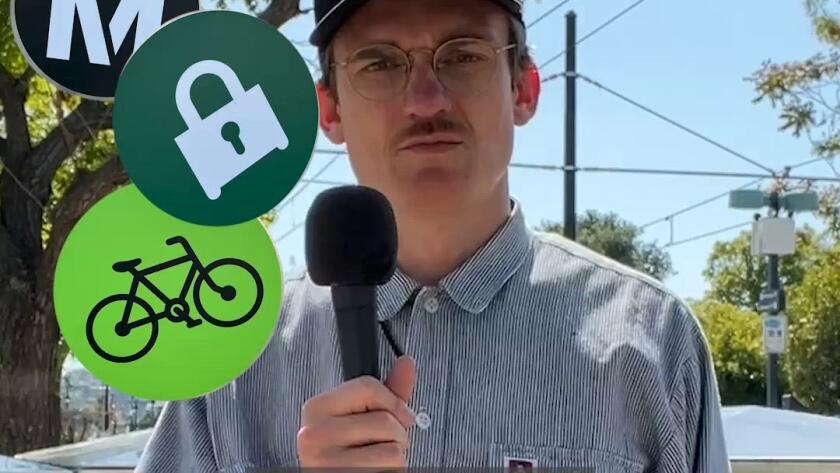Los Angeles Metro relaunches its bike locker program
Metro’s revamp of its bike locker program allows for short-term, flexible rentals starting at $0.75 for the first 12 hours.
- Share via
May is Bike Month and Metro has revamped its bike locker program.
Before, users had to rent lockers for six months at a time, pay a deposit and pick up a key from Metro. It was an opaque system with a lot of friction.
The revised bike locker system is set up for short-term, flexible rentals. The first 12 hours cost $0.75 and users can rent for up to 72 hours. Lockers now have room for longtail cargo bikes.
To use the system, bike owners must first sign up with BikeLink, the app that Metro has partnered with to make these bike lockers work. Users first add money to their profile and share their location so the app knows which locker to rent. Then users swipe to confirm their location and the locker door opens. Bike owners then put their bike in the locker and close the door, which then locks the bike inside.
Phase one of the program launched May 9 at the following Metro stations:
- Highland Park (A Line): 20 lockers
- Monrovia (A Line): 9 lockers
- Wardlow (A Line): 15 lockers
- Universal City (B Line): 32 lockers
- Redondo Beach (C Line): 7 lockers
- Wilshire/Western (D Line): 19 lockers in two locations, 13 at street level and 6 on mezzanine level
- Culver City (E Line): 8 lockers
- Canoga (G Line) 16 lockers
- 37th/USC (J Line) 4 lockers
Metro says it will soon roll out a phase two for the following lines:
- A Line: APU/Citrus, Arcadia, Florence, Memorial Park
- B Line: Vermont/Santa Monica, Westlake/MacArthur, Wilshire/Vermont
- C Line: Crenshaw, El Segundo, Lakewood, Norwalk
- E Line: 17th St/SMC, Atlantic, Expo/Bundy, La Cienega/Jefferson, Mariachi Plaza, Soto
- G Line: Reseda, Sherman Way
- J Line: El Monte, Harbor Gateway Transit Center
Metro says, after phase two is complete, there will be close to 1000 bike lockers across the system.
People who don’t have smartphones can use the bike lockers, but it is more cumbersome. The system does not accept cash, so users should head to bikelink.org and register a TAP card then enable funds to be transferred from the TAP card to a BikeLink account.
With this reworked system, no one person owns a locker, and users can check how many lockers are open via the app before leaving on a trip. To see if you have lockers near you, check the map in the app. Ride safe.
Before, users had to rent lockers for six months at a time, pay a deposit and pick up a key from Metro. It was an opaque system with a lot of friction.
The revised bike locker system is set up for short-term, flexible rentals. The first 12 hours cost $0.75 and users can rent for up to 72 hours. Lockers now have room for longtail cargo bikes.
To use the system, bike owners must first sign up with BikeLink, the app that Metro has partnered with to make these bike lockers work. Users first add money to their profile and share their location so the app knows which locker to rent. Then users swipe to confirm their location and the locker door opens. Bike owners then put their bike in the locker and close the door, which then locks the bike inside.
Phase one of the program launched May 9 at the following Metro stations:
- Highland Park (A Line): 20 lockers
- Monrovia (A Line): 9 lockers
- Wardlow (A Line): 15 lockers
- Universal City (B Line): 32 lockers
- Redondo Beach (C Line): 7 lockers
- Wilshire/Western (D Line): 19 lockers in two locations, 13 at street level and 6 on mezzanine level
- Culver City (E Line): 8 lockers
- Canoga (G Line) 16 lockers
- 37th/USC (J Line) 4 lockers
Metro says it will soon roll out a phase two for the following lines:
- A Line: APU/Citrus, Arcadia, Florence, Memorial Park
- B Line: Vermont/Santa Monica, Westlake/MacArthur, Wilshire/Vermont
- C Line: Crenshaw, El Segundo, Lakewood, Norwalk
- E Line: 17th St/SMC, Atlantic, Expo/Bundy, La Cienega/Jefferson, Mariachi Plaza, Soto
- G Line: Reseda, Sherman Way
- J Line: El Monte, Harbor Gateway Transit Center
Metro says, after phase two is complete, there will be close to 1000 bike lockers across the system.
People who don’t have smartphones can use the bike lockers, but it is more cumbersome. The system does not accept cash, so users should head to bikelink.org and register a TAP card then enable funds to be transferred from the TAP card to a BikeLink account.
With this reworked system, no one person owns a locker, and users can check how many lockers are open via the app before leaving on a trip. To see if you have lockers near you, check the map in the app. Ride safe.

